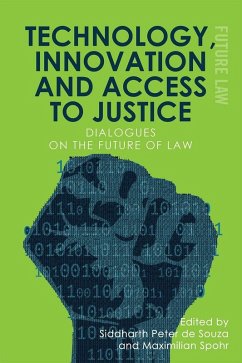Technology, Innovation and Access to Justice (eBook, ePUB)
Redaktion: de Souza, Siddharth Peter
25,95 €
25,95 €
inkl. MwSt.
Sofort per Download lieferbar

13 °P sammeln
25,95 €
Als Download kaufen

25,95 €
inkl. MwSt.
Sofort per Download lieferbar

13 °P sammeln
Jetzt verschenken
Alle Infos zum eBook verschenken
25,95 €
inkl. MwSt.
Sofort per Download lieferbar
Alle Infos zum eBook verschenken

13 °P sammeln
Technology, Innovation and Access to Justice (eBook, ePUB)
Redaktion: de Souza, Siddharth Peter
- Format: ePub
- Merkliste
- Auf die Merkliste
- Bewerten Bewerten
- Teilen
- Produkt teilen
- Produkterinnerung
- Produkterinnerung

Bitte loggen Sie sich zunächst in Ihr Kundenkonto ein oder registrieren Sie sich bei
bücher.de, um das eBook-Abo tolino select nutzen zu können.
Hier können Sie sich einloggen
Hier können Sie sich einloggen
Sie sind bereits eingeloggt. Klicken Sie auf 2. tolino select Abo, um fortzufahren.

Bitte loggen Sie sich zunächst in Ihr Kundenkonto ein oder registrieren Sie sich bei bücher.de, um das eBook-Abo tolino select nutzen zu können.
Around four billion people globally are unable to address their everyday legal problems and do not have the security, opportunity or protection to redress their grievances and injustices.
- Geräte: eReader
- mit Kopierschutz
- eBook Hilfe
- Größe: 0.66MB
- FamilySharing(5)
Andere Kunden interessierten sich auch für
![The Digital Republic (eBook, ePUB) The Digital Republic (eBook, ePUB)]() Jamie SusskindThe Digital Republic (eBook, ePUB)14,83 €
Jamie SusskindThe Digital Republic (eBook, ePUB)14,83 €![European Court of Human Rights (eBook, ePUB) European Court of Human Rights (eBook, ePUB)]() European Court of Human Rights (eBook, ePUB)23,95 €
European Court of Human Rights (eBook, ePUB)23,95 €![Access to Justice and International Organisations (eBook, ePUB) Access to Justice and International Organisations (eBook, ePUB)]() Rishi GulatiAccess to Justice and International Organisations (eBook, ePUB)65,95 €
Rishi GulatiAccess to Justice and International Organisations (eBook, ePUB)65,95 €![Taking a Case to the European Court of Human Rights (eBook, ePUB) Taking a Case to the European Court of Human Rights (eBook, ePUB)]() Philip LeachTaking a Case to the European Court of Human Rights (eBook, ePUB)46,95 €
Philip LeachTaking a Case to the European Court of Human Rights (eBook, ePUB)46,95 €![Taking a Case to the European Court of Human Rights (eBook, ePUB) Taking a Case to the European Court of Human Rights (eBook, ePUB)]() Philip LeachTaking a Case to the European Court of Human Rights (eBook, ePUB)41,95 €
Philip LeachTaking a Case to the European Court of Human Rights (eBook, ePUB)41,95 €![Innovation and Its Enemies (eBook, ePUB) Innovation and Its Enemies (eBook, ePUB)]() Calestous JumaInnovation and Its Enemies (eBook, ePUB)18,95 €
Calestous JumaInnovation and Its Enemies (eBook, ePUB)18,95 €![Access to Justice for the Urban Poor (eBook, ePUB) Access to Justice for the Urban Poor (eBook, ePUB)]() Access to Justice for the Urban Poor (eBook, ePUB)3,99 €
Access to Justice for the Urban Poor (eBook, ePUB)3,99 €-
-
-
Around four billion people globally are unable to address their everyday legal problems and do not have the security, opportunity or protection to redress their grievances and injustices.
Dieser Download kann aus rechtlichen Gründen nur mit Rechnungsadresse in A, B, BG, CY, CZ, D, DK, EW, E, FIN, F, GR, HR, H, IRL, I, LT, L, LR, M, NL, PL, P, R, S, SLO, SK ausgeliefert werden.
Produktdetails
- Produktdetails
- Verlag: Edinburgh University Press
- Seitenzahl: 320
- Erscheinungstermin: 31. Januar 2021
- Englisch
- ISBN-13: 9781474476898
- Artikelnr.: 68968540
- Verlag: Edinburgh University Press
- Seitenzahl: 320
- Erscheinungstermin: 31. Januar 2021
- Englisch
- ISBN-13: 9781474476898
- Artikelnr.: 68968540
- Herstellerkennzeichnung Die Herstellerinformationen sind derzeit nicht verfügbar.
Siddharth Peter de Souza is a research fellow and PhD candidate at the Humboldt University of Berlin. Maximilian Spohr is Policy Advisor on Civil Rights and Digitisation at the Friedrich Naumann Foundation for Freedom, primarily leading the foundation's international human rights program. He holds a PhD in Public International Law from the University of Heidelberg.
Foreword
Maurits Barendrecht
1. Introduction - Making Access to Justice Count: Debating the Future of
Law
Siddharth Peter de Souza and Maximilian Spohr
Part I: Mapping the Private Sector
2. How Can Law Firms Contribute to Access to Justice in an Age of
Technology and Digitalisation? Pro Bono, Law Firm Innovation and Ideas for
the Legal Community
Özgür Kahale
3. How Technology Is Changing the Nature of Work and Altering the Practice
of Law
Suzanna Kalendzhian
4. Future of Law - Increasing the Access to Justice through Technology
Odunoluwa Longe
5. The Future of Law: Technology, Innovation and Access to Justice in Legal
Services around the World
Roger Smith
Part II: Smart Government: Building Responsive Future-Ready Institutions
6. Automating Government Decision-making: Implications for the Rule of Law
Monika Zalnieriute, Lyria Bennett Moses and George Williams
7. Sustainable AI Development (SAID): On the Road to More Access to Justice
Christian Djeffal
8. Digital Justice: Nice to Have But Hard to Achieve
Dory Reiling
9. Improving Access to Justice Through Social Media Service of Process In
Germany: Thinking Outside The (In)box
Cedric Vanleenhove
Part III: Civil Society: Realizing the Implications of Technology Change
10. Gamified Digital Advocacy and the Future of Law
Gianluca Sgueo
11. Communicating the Law: Thinking through Design, Visuals and
Presentation of Legal Content
Siddharth Peter de Souza
12. Digital Rights and Data Protection
Alistair Alexander & Mira Suleimenova
13. Friend or foe?: Examining the Potential and Pitfalls of ICTs in
Improving Access to Justice in Post-Conflict Countries
Astrid Wiik
Part IV: Reflecting on Legal Education in the Future
14. Elements of a Strategic Roadmap to Legal Education and Accreditation in
the Digital Environment
Ana Paula Camelo & Claudio Lucena
15. Challenges and Opportunities: Engaging a Reluctant Profession in Its
Own Future
Aviva Rotenberg
16. The Long and Short of It: How Legal Education Can Help Solve the
Profession's Identity Crisis
Maeve Lavelle
17. Teaching Law after the #feesmustfall Protests - How Technology Saved
the Day at UWC
Angelo Dube
Maurits Barendrecht
1. Introduction - Making Access to Justice Count: Debating the Future of
Law
Siddharth Peter de Souza and Maximilian Spohr
Part I: Mapping the Private Sector
2. How Can Law Firms Contribute to Access to Justice in an Age of
Technology and Digitalisation? Pro Bono, Law Firm Innovation and Ideas for
the Legal Community
Özgür Kahale
3. How Technology Is Changing the Nature of Work and Altering the Practice
of Law
Suzanna Kalendzhian
4. Future of Law - Increasing the Access to Justice through Technology
Odunoluwa Longe
5. The Future of Law: Technology, Innovation and Access to Justice in Legal
Services around the World
Roger Smith
Part II: Smart Government: Building Responsive Future-Ready Institutions
6. Automating Government Decision-making: Implications for the Rule of Law
Monika Zalnieriute, Lyria Bennett Moses and George Williams
7. Sustainable AI Development (SAID): On the Road to More Access to Justice
Christian Djeffal
8. Digital Justice: Nice to Have But Hard to Achieve
Dory Reiling
9. Improving Access to Justice Through Social Media Service of Process In
Germany: Thinking Outside The (In)box
Cedric Vanleenhove
Part III: Civil Society: Realizing the Implications of Technology Change
10. Gamified Digital Advocacy and the Future of Law
Gianluca Sgueo
11. Communicating the Law: Thinking through Design, Visuals and
Presentation of Legal Content
Siddharth Peter de Souza
12. Digital Rights and Data Protection
Alistair Alexander & Mira Suleimenova
13. Friend or foe?: Examining the Potential and Pitfalls of ICTs in
Improving Access to Justice in Post-Conflict Countries
Astrid Wiik
Part IV: Reflecting on Legal Education in the Future
14. Elements of a Strategic Roadmap to Legal Education and Accreditation in
the Digital Environment
Ana Paula Camelo & Claudio Lucena
15. Challenges and Opportunities: Engaging a Reluctant Profession in Its
Own Future
Aviva Rotenberg
16. The Long and Short of It: How Legal Education Can Help Solve the
Profession's Identity Crisis
Maeve Lavelle
17. Teaching Law after the #feesmustfall Protests - How Technology Saved
the Day at UWC
Angelo Dube
Foreword
Maurits Barendrecht
1. Introduction - Making Access to Justice Count: Debating the Future of
Law
Siddharth Peter de Souza and Maximilian Spohr
Part I: Mapping the Private Sector
2. How Can Law Firms Contribute to Access to Justice in an Age of
Technology and Digitalisation? Pro Bono, Law Firm Innovation and Ideas for
the Legal Community
Özgür Kahale
3. How Technology Is Changing the Nature of Work and Altering the Practice
of Law
Suzanna Kalendzhian
4. Future of Law - Increasing the Access to Justice through Technology
Odunoluwa Longe
5. The Future of Law: Technology, Innovation and Access to Justice in Legal
Services around the World
Roger Smith
Part II: Smart Government: Building Responsive Future-Ready Institutions
6. Automating Government Decision-making: Implications for the Rule of Law
Monika Zalnieriute, Lyria Bennett Moses and George Williams
7. Sustainable AI Development (SAID): On the Road to More Access to Justice
Christian Djeffal
8. Digital Justice: Nice to Have But Hard to Achieve
Dory Reiling
9. Improving Access to Justice Through Social Media Service of Process In
Germany: Thinking Outside The (In)box
Cedric Vanleenhove
Part III: Civil Society: Realizing the Implications of Technology Change
10. Gamified Digital Advocacy and the Future of Law
Gianluca Sgueo
11. Communicating the Law: Thinking through Design, Visuals and
Presentation of Legal Content
Siddharth Peter de Souza
12. Digital Rights and Data Protection
Alistair Alexander & Mira Suleimenova
13. Friend or foe?: Examining the Potential and Pitfalls of ICTs in
Improving Access to Justice in Post-Conflict Countries
Astrid Wiik
Part IV: Reflecting on Legal Education in the Future
14. Elements of a Strategic Roadmap to Legal Education and Accreditation in
the Digital Environment
Ana Paula Camelo & Claudio Lucena
15. Challenges and Opportunities: Engaging a Reluctant Profession in Its
Own Future
Aviva Rotenberg
16. The Long and Short of It: How Legal Education Can Help Solve the
Profession's Identity Crisis
Maeve Lavelle
17. Teaching Law after the #feesmustfall Protests - How Technology Saved
the Day at UWC
Angelo Dube
Maurits Barendrecht
1. Introduction - Making Access to Justice Count: Debating the Future of
Law
Siddharth Peter de Souza and Maximilian Spohr
Part I: Mapping the Private Sector
2. How Can Law Firms Contribute to Access to Justice in an Age of
Technology and Digitalisation? Pro Bono, Law Firm Innovation and Ideas for
the Legal Community
Özgür Kahale
3. How Technology Is Changing the Nature of Work and Altering the Practice
of Law
Suzanna Kalendzhian
4. Future of Law - Increasing the Access to Justice through Technology
Odunoluwa Longe
5. The Future of Law: Technology, Innovation and Access to Justice in Legal
Services around the World
Roger Smith
Part II: Smart Government: Building Responsive Future-Ready Institutions
6. Automating Government Decision-making: Implications for the Rule of Law
Monika Zalnieriute, Lyria Bennett Moses and George Williams
7. Sustainable AI Development (SAID): On the Road to More Access to Justice
Christian Djeffal
8. Digital Justice: Nice to Have But Hard to Achieve
Dory Reiling
9. Improving Access to Justice Through Social Media Service of Process In
Germany: Thinking Outside The (In)box
Cedric Vanleenhove
Part III: Civil Society: Realizing the Implications of Technology Change
10. Gamified Digital Advocacy and the Future of Law
Gianluca Sgueo
11. Communicating the Law: Thinking through Design, Visuals and
Presentation of Legal Content
Siddharth Peter de Souza
12. Digital Rights and Data Protection
Alistair Alexander & Mira Suleimenova
13. Friend or foe?: Examining the Potential and Pitfalls of ICTs in
Improving Access to Justice in Post-Conflict Countries
Astrid Wiik
Part IV: Reflecting on Legal Education in the Future
14. Elements of a Strategic Roadmap to Legal Education and Accreditation in
the Digital Environment
Ana Paula Camelo & Claudio Lucena
15. Challenges and Opportunities: Engaging a Reluctant Profession in Its
Own Future
Aviva Rotenberg
16. The Long and Short of It: How Legal Education Can Help Solve the
Profession's Identity Crisis
Maeve Lavelle
17. Teaching Law after the #feesmustfall Protests - How Technology Saved
the Day at UWC
Angelo Dube







